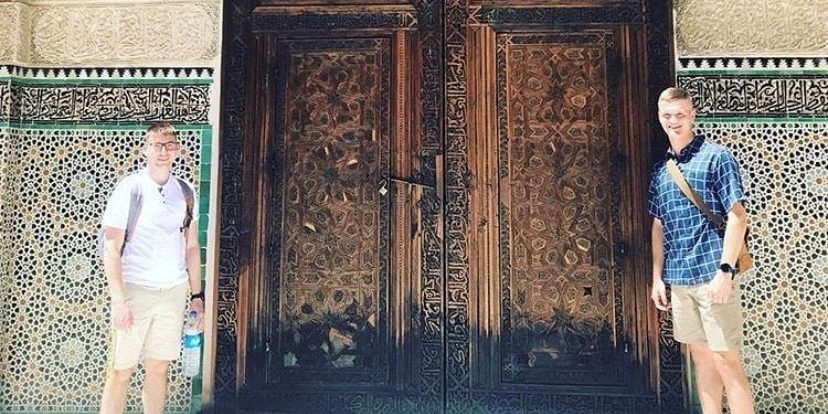International Programs: “Open the Aperture Wider”

Cadets Jonah Eger ’21 and Adam Fodness ’21 in Morocco in 2019. Photo courtesy Project GO VMI.

Cadets Jonah Eger ’21 and Adam Fodness ’21 in Morocco in 2019. Photo courtesy Project GO VMI.
It is said that the only constant in life is change. Although the Institute remains timeless in so many ways, it also embraces the changes necessary to ensure its graduates are prepared to be leaders in whatever they do – and wherever they do it.
One of these changes is the transformation of the “operating environment or, if you want to use a less military sounding term, workspace,” according to retired U.S. Marine Corps Col. David B. Hall ’83, International Programs director. “The world today is characterized by interconnectedness, complexity and sudden change that is driven by globalization and technologies that facilitate an ever-faster flow of people, products and information across international borders.”
“There also is a geostrategic shift as powers like China and India continue to rise,” he continued, “and Central Asia becomes more important especially in terms of energy and acts increasingly as a crossroads between Europe and the rising countries of Asia.”
According to Hall, this means that perspective employers – whether they be corporations, governments, nongovernmental organizations or the military – will be looking for people who are bilingual or multilingual and who have experience – preferably firsthand – with different cultures, often described as “cultural fluency.”
“Acquiring these highly sought-after skillsets solely through a traditional classroom-based education is challenging at best,” said Hall. “It is best for our cadets to experience languages and cultures firsthand because doing so heightens the possibility of them having a lasting impact.”
But, it’s not just an improved education and better language skills that cadets receive from their study abroad experiences. They report an increase in their self-confidence, maturity and independence. “They also state that they return with an enhanced ability to adapt to new environments, handle difficult situations with tact and diplomacy, take the initiative, and work as part of a team,” he said. “Many also tell us that becoming aware of another culture has heightened their appreciation of American culture.”
For these reasons – and many others – one of the Institute’s long-range goals is that every VMI cadet who aspires to study abroad or participate in a similar cross-cultural experience – such as international internship, research or service learning – has the opportunity to do so.
In the 2018-19 academic year, 164 cadets participated in programs that, as Hall puts it, “open the aperture wider for our cadets and help them gain a wider, more global perspective.” Of them, two spent a semester at Lithuania’s military academy as part of an exchange program. Five cadets participated in a 15-day strategy and policy tour of Israel – at no cost to them, thanks to the generosity of an organization known as Our Soldiers Speak and VMI. During spring furlough, six cadets took part in the Law of Armed Conflict competition in San Remo, Italy, and eight cadets traveled to Vietnam, an experience paid entirely by the Olmsted Foundation.
As has been the case for many years, however, summer is when most cadets participate in study abroad, with the vast majority – 99 this summer – taking part in seven different VMI programs related to language, culture, economics, engineering and science in the United Kingdom, France, Spain, Belize, Germany, China and Morocco.
All of these programs, except one in Morocco and the Virginia Program at Oxford, are designed and organized by members of the VMI faculty. In the role of program director, a faculty member will spend 18 to 24 months taking his or her concept through the stages of design, planning, coordination, and gaining the approval of VMI’s Academic Board.
It is a demanding job described by Hall as “not only as the cadets’ instructor, but also as their adviser, mentor, cultural liaison, disciplinarian, tour guide and myriad other roles.” Although it is demanding, faculty members find the experience of being a program director most satisfying, because according to Hall, “It provides them with an opportunity to develop cadets in a profound manner and in a setting that cannot be replicated anywhere on post.”
One of the more interesting programs this summer is the one in Morocco which is offered under the auspices of Project Global Officer or Project GO of the Department of Defense. The Pentagon established the program in 2007 in order to improve future military officers’ language and cultural skills as well as their regional expertise. Funded by the Defense Language and National Security Education Office and organized by the Institute of International Education, it achieves this goal through resident language training and summer overseas language and cultural immersion.
Last year, VMI submitted a proposal for a Project GO grant and was awarded nearly $250,000 in support of its Arabic Language Study Abroad Program. This support allowed the Institute to offer 15 cadets the opportunity to take part in the seven-week program in Morocco. For those scholarships, 172 cadets and midshipmen from across the nation submitted applications to an eight-person committee made up of members of all three ROTC Detachments, the Department of Modern Languages & Cultures, and Office of International Programs.
“We had such a response for two reasons,” explained Hall. “The first is that it is open to all cadets enrolled in ROTC, regardless of major. In fact, the DoD encourages STEM majors to apply. The second is that these are full scholarships, which, this year, totaled $9,842 per cadet. That means cadets have no program-related out-of-pocket expenses.”
Thanks to endowments established by friends and alumni, VMI can award 22 partial scholarships to defray the cost of other study abroad opportunities. While they are appreciated, Hall stresses that the costs of study abroad programs have accelerated over the ability of scholarships to cover the costs. “A semester program can cost between $12,000 and $17,000, and our four-week summer programs require between $5,000 and $6,900. In both cases, those figures do not include airfare and incidental expenses like spending money.”
“Cadets’ experiences with international programs are almost uniformly positive – extremely positive,” said Hall. “When those who were abroad this summer and the second semester of last year return to barracks, their stories certainly will whet the appetite of other cadets for the same type of experience.”
“I am hopeful, therefore, that in the future we have the resources needed to ensure that cadets can take advantage of every opportunity to be a part of programs that will equip them with the skills they’ll need to excel in today’s global operating environment,” concluded Hall.
For more information on the Office of International Programs, visit its webpage at www.vmi.edu/academics/academic-program/international-programs/ or contact Col. Hall ’83 at halldb@vmi.edu or 540-464-7350.

The communications officer supports the strategy for all communications, including web content, public relations messages and collateral pieces in order to articulate and promote the mission of the VMI Alumni Agencies and promote philanthropy among varied constituencies.